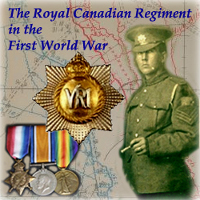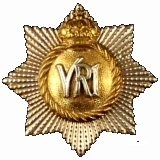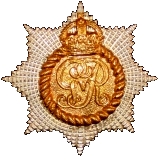
The Royal Canadian Regiment and
The First World War - 1914-1919
Overseas with The Royals
By: 491091 Ralph Jackson (Attestation paper - front, back) (Reproduced from Pro Patria #26, November 1975)
Just for fun, I will tell you about my first trip to Europe and the events leading up to it during World War I.
The first step was taken when a few days before my twenty-first birthday in June, 1915, I enlisted in the Thirty-third Battalion, Canadian Expeditionary Force, stationed on Carling Heights, just east of Wolseley Barracks, London. It was my choice because my brother Reynolds had joined it a few months earlier. We lived in tents with wooden floor boards, alongside the Thirty-fourth. Our pay was a dollar and ten cents a day. Route marches were enjoyable, our longest to Ingersoll and back the next day, everyone singing "It's a Long Way to Tipperary" and other songs. The churches were so good to us with invitations to wonderful suppers, a welcome change from army rations. We went even as far as Thamesville (by train) to one. We had special parades such as when Sir Sam Hughes reviewed the troops.
A special detached company left for overseas in late summer, Reynolds included. Our battalion really got toughened up as we lived in our tents until December 7th, then proceeded to Quebec City for the remainder of the winter. Our quarters were the Immigration Buildings by the river. A wonderful place historically and my highlight was a New Year's Eve dinner at the "Chateau Frontenac" with a chum.
We resumed our journey to the coast in March and found two troopships ready to sail from Halifax - S.S. Lapland and S.S. Metagama. Soon they were filled with several thousand Canadian soldiers and set sail. I was a fairly good sailor, sick for only half a day out. of seven on the ocean. We were to be met about half way across by a British navy destroyer escort as German submarines were prowling the Atlantic looking for victims. It was the thrill of a lifetime to see them (not the subs!) arrive on the dot, everyone on deck in the bright sunshine cheering, our band playing "Rule, Brittania" and the sailors responding heartily. From then on we pursued a zig-zag course and arrived safely in Liverpool. I remember the waves were very high during our Sunday church service as we sang:- Oh, hear us when we cry to Thee For those in peril on the sea.
The English trains looked small to us but took us quickly across country to the lovely south-east county of Kent and Shornecliffe camp. The training here was stiffer and they soon found out who was fit and who was not. One day while marching through a village I was surprised to hear someone call "Hello! Ralph". Come to find out it was George Colvin from Lobo. I tried to get a pass to visit my cousin Beatrice Jackson nursing in Dublin but by the time it was due orders came to proceed to France. Otherwise, I would have landed in the midst of that Easter Rebellion!
Our battalion was broken up to reinforce others and I was pleased to join The Royal Canadian Regiment, "the good old RCR".
Along with the Princess Pats, 42nd Highlanders and 49th Battalion we formed the Seventh Brigade of the Third Canadian Division. We embarked at Southampton for the channel crossing. It was at night, no lights, everyone below deck, choppy waves and I'm sure everybody was sick. We landed safely at Le Havre. About this time a case of German measles was discovered so half a dozen of us were quarantined there for three weeks while the rest went on up the line where the fighting was severe.
On reporting to our unit we found it helping to hold the line in the famous Ypres salient where the enemy could shoot at us from three sides. One could be in the front line for weeks and never see a German; never-the-less it was sudden death to show your head above the parapet (snipers) beside machine gun and artillery fire. Most nights were spent in "no-man's-land" filling sandbags to rebuild the walls of the trench blown down the day before. If the enemy sent up "star-shells " to light up the whole place the idea was to "freeze ft in any position you happened to be in. Good idea but you never knew when the machine guns would open up. Yes there were times when we knew what fear was but it helped to know the folks back home were praying for me. One very dark night a chum and I got lost out there and it was a weird feeling not knowing if you were heading for the German lines or your own \no land marks). However, we made it back safely. Each morning just before dawn we stood on guard as it was the most likely time for an attack.
Toward the end of June a few of us were detailed for trench warden duty which included the up-building and maintaining of a "strong-point" a mile or so back of the line'. The idea was to provide a rallying point if the enemy broke through (don't think it was ever used). One day a chap from another unit was visiting in our tent and said Reynolds Jackson (401134, Attestation paper - front, back) was killed in action near Zillebeke. Only when he saw the stunned look on my face did he realize I was a brother; he was very sorry but did not know my name.
Soon we were taking our regular turns in the front line trenches. We slept in small dugouts in the side of the trench (sometimes visited by rats). Two of our songs:-
Far, far from Ypres I want to be
Where German snipers can't shoot at me,
Deep is my dugout, wet are my feet,
Send me a whizz-bang and put me to sleep.
Jack Johnsons and Shrapnel they over me roar
I don't want to go to the front anymore,
Take me over the sea, where the Allemand can't get at me
Oh, my, I don't want to die, I want to go home.
We did have our lighter moments as when a shell exploded beside the dugout of Davy our stretcher-bearer and he crawled out spattered with condensed milk. We just stood there and laughed even though the shells were still dropping nearby. Occasionally there would be exciting dog-fights overhead when our fliers encountered enemy planes and one would come down in a trail of smoke. It was remarkable how well our rations and drinking water arrived most of the time as they had to be transported the last half mile or so by hand over very rough ground. Our greatest treat was to get letters or parcels from home.
This was the year the Canadian soldiers originated trench raids, a quick attack on the Germans by a small group (30 or so) the success of which depended on the element of surprise. The RCR attempted one about the middle of August but something went wrong and casualties were heavy. I will never forget the tremendous bombardment the enemy turned on us that night. The next morning I helped to carry one of our wounded back to the First Aid station. It was an exhausting task because we would come to right angle turns in the trenches and have to raise the stretcher above our heads to make the turn. Finally we reached the light railway line and a hand car.
Of course we had been hearing exciting stories of the Battle of the Somme and soon received orders to take part in it. All the fellows welcomed the change to fighting in the open even if it might be more dangerous. There was the greatest concentration of artillery in history. One day we were reviewed by Sir Julian Byng, a fine general of Vimy Ridge fame. As we marched past the town of Albert one of the first tanks was ay the roadside and it looked like a prehistoric monster to us. As we advanced shell craters were everywhere and roadbuilders were busy. We would meet long lines of German prisoners in charge of one or two British soldiers. Reports came in daily of new victories for the Allies and there was great optimism. (Sorry to say our hopes were dashed, campaign started too late in the season and ended in the rain and mud of Passchendaele).
Our big battle, Courcelette, came at the middle of September. We occupied our position near the smashed village of Contalmaison in the afternoon and were to go over the top at a certain moment. Our officer gave the signal and started. Almost immediately he was struck by a bullet, the sergeant stopped to help him and this left me to lead the way. At one point we had to walk over bodies. On the new line the urgent task was to dig a fox-hole with our entrenching tool. A short time later an officer came along calling for volunteers to dig out one of our men who had been buried alive by a shell explosion. Another chap and I had quite a job as the chalky soil kept rolling back in. The shrapnel was still flying around as I found later quite a dent in my steel helmet. He was badly shell shocked when rescued.
Looking out over the field of battle was almost like seeing a giant moving picture -- a long line of Canadians going forward as if on parade, with now and then one stumbling and falling. I was thrilled and proud to be there, too excited to be afraid. A bit later it started to rain and turn cold. One of our wounded started to cry out because of it so when a chap came along wearing a raincoat I asked him if he would lend it to the suffering man. He agreed but only when he took it off did I realize he was an officer.
It was not long after this, when we were back in rest camp, word came I was to go to England on my way home to look after my younger brothers and sisters on the farm (mother was dead and father in hospital). Had a wonderful visit in Old London for six days and still think it is the greatest! Stayed at the Maple Leaf Club in Berkeley Square, went with groups of wounded soldiers to many historical buildings and places, one day having luncheon with the Lord Mayor. Sailed home in style on the S.S. Empress of Britain.
(Private Ralph Jackson served in the field with The RCR under the service numbers 401017 and 491091, changing from the former to the latter number on 12 Jun 1916. He joined the Regiment in the field on 8 May 1916, transferring from the 33rd Reserve Battalion. He was struck off the strength of the Regiment on 24 Sep 1916 when he was transferred to the Canadian Training Division for discharge on Compassionate grounds. - M.M.O.)
Pro Patria
- The O'Leary Collection; Medals of The Royal Canadian Regiment.
- Researching Canadian Soldiers of the First World War
- Researching The Royal Canadian Regiment
- The RCR in the First World War
- Badges of The RCR
- The Senior Subaltern
- The Minute Book
- Rogue Papers
- Tactical Primers
- The Regimental Library
- Battle Honours
- Perpetuation of the CEF
- A Miscellany
- Quotes
- The Frontenac Times
- Site Map

![]() The RCR in the Great War
The RCR in the Great War
![]() War Diary
War Diary
![]() Battle Honours
Battle Honours
![]() Battle Bars and The RCR
Battle Bars and The RCR
![]() The RCR Battle Bar Ledger (pdf)
The RCR Battle Bar Ledger (pdf)
![]() Honours and Awards
Honours and Awards
![]() Roll of Honour
Roll of Honour
![]() Prisoners of War
Prisoners of War
![]() Cemetery List
Cemetery List
![]() Cemetery Map
Cemetery Map
![]() Courts Martial
Courts Martial
![]() Officers
Officers
![]() RSMs of The RCR (1914-1919)
RSMs of The RCR (1914-1919)
![]() NCOs and Soldiers
NCOs and Soldiers
![]() An Officer's Diary (1914-1918)
An Officer's Diary (1914-1918)
![]() Recollections of a Nonagenerian (R. England) (1916-1919)
Recollections of a Nonagenerian (R. England) (1916-1919)
![]() On to Bermuda (1914-15)
On to Bermuda (1914-15)
![]() England and France 1915-1916 (Hayes; 1931)
England and France 1915-1916 (Hayes; 1931)
![]() Overseas with The Royals (1915)
Overseas with The Royals (1915)
![]() Regimental History Pamphlet (1917)
Regimental History Pamphlet (1917)
![]() Amiens (1918)
Amiens (1918)
![]() Cambrai (1918)
Cambrai (1918)
![]() Monchy-le-Preux (1918)
Monchy-le-Preux (1918)
![]() Under-aged Soldiers in The RCR
Under-aged Soldiers in The RCR
![]() Not All Were Volunteers; The RCR and the Military Service Act
Not All Were Volunteers; The RCR and the Military Service Act
![]() Sentenced to Death by Court Martial
Sentenced to Death by Court Martial
![]() The 7th Trench Mortar Battery
The 7th Trench Mortar Battery
![]() A Regimental Goat
A Regimental Goat
![]() Regiment and Family, Bermuda 1914-15
Regiment and Family, Bermuda 1914-15
![]() "March the Guilty Bastard In"
"March the Guilty Bastard In"
![]() Surrendered as Stowaway
Surrendered as Stowaway
![]() Re-Visiting the Great War Roll of Honour for The RCR
Re-Visiting the Great War Roll of Honour for The RCR
![]() Canadian Corps Trench Standing Orders (1916)
Canadian Corps Trench Standing Orders (1916)

